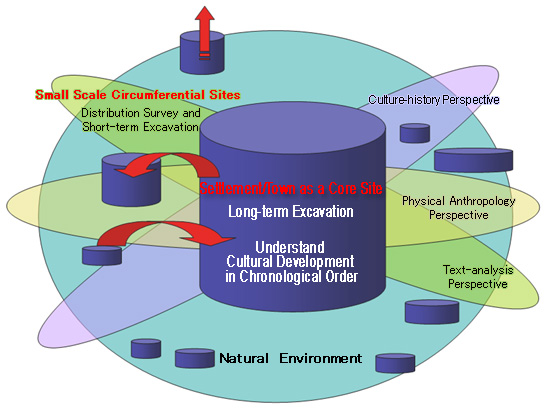|
|
 |
 |
 |
| ‘@Purpose@‘ |
| Method of Research |
The aim of this research is, with a key-word
gtribalism,h a critical concept to understand the Middle Eastern
cities, to clarify its historical importance with specific archaeological
examples by going back to the process of formation of prehistoric
settled societies/tribal societies, and tracing the process of
transforming into the co-existence of tribal societies and cities,
or inclusion into cities, or separation from the cities
In other words, the aim of this research is to clarify the historical
uniqueness of the Middle Eastern societies which co-existed and
linked with tribal communities throughout time.
To pursue this task, first, we will select the site of a city or
a settlement in the Bishri mountains as a core site, and carry
out fixed point survey research by all the planed research groups.
Throughout the project, we will grasp the cultural transition
of this area in chronological order. Concurrently, we will conduct
field research of the circumference area, and a small scale short
term survey research on all the other sites related to the core
site.
Then, based on the comparison between those two efforts, we will
clarify, in specific, the process which the circumferential tribal
communities were incorporated into the city, or the process which
the tribal communities were alienated from the city, or the process
which they co-existed.
Above is the basic approach of this project. |
 |
 |
 |
We examine different issues behind the
main topic, too.
For example, an issue of natural environment, movement of tribes
and its accompanying friction or conciliation recorded in the clay
tablets, cultural transformation such as architectural styles,
diets, and fine arts, and physical anthropology such as the transformation
of the human biological features.
The core point to organically integrate these researches in different
fields, is the concept of gtribalism,h as already mentioned. |
 |
|
| @ |
|
 |
| |
| Copyright (C) 2005-2007 Kokushikan University |
|
|

